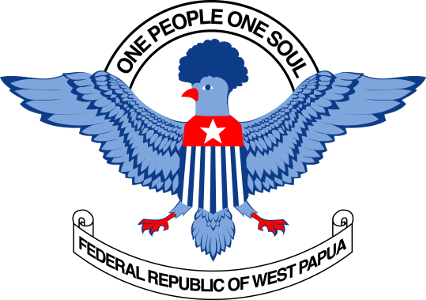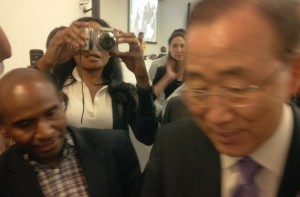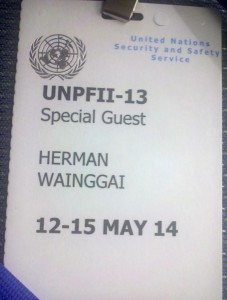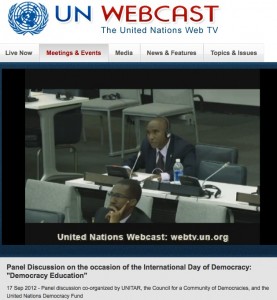Herman was born in Yapen Island, into a tradition of orators, craftsmen, politicians, and musicians, and his activism is strongly influenced by the grace-filled virtues of justice, peace, and love. His passion for his nation’s political development was inspired by his father’s brother, Dr Thomas Wainggai, a formidable public servant and academic incarcerated for subversion after raising the flag of ‘West Melanesia’ in 1988. Sunday-visits to Abepura Prison with good food and clean clothes for his uncle were lessons in West Papua’s unique weave of politics, religion, and culture, and Herman was inconsolable when the government relocated Thomas to Cipinang Prison in Jakarta (where he died in 1996, poisoned by Indonesian Intelligence).
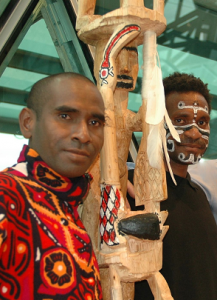
Herman with Stefanus Akanmor at The Boite Peace Child Concert at BMW Edge Theatre, Melbourne, December 2006
In 1989 the first generation of West Melanesia lecturers at Cenderawasih University were all incarcerated, so when Herman enrolled to study law, there was just one young lecturer mentoring the students in West Papua’s history and developing West Melanesia’s imaginary weave of indigenous culture and God’s laws as well as the modern regime of secular laws. His first venture into politics was to form the West Papua National Youth Awareness Team (WESTPANYAT) to develop, practice, and promote non-violent resistance. The Team began with seven students in a workshop developing legal argument and political debate around the New York Agreement (by which a Cold War coalition of allies gifted West Papua to Indonesia). By the time most of the lecturers were released, thousands of student-activists were raising awareness of Melanesian culture and identity throughout West Papua, as well as across Papua New Guinea, Bougainville, the Solomons, Fiji, Kanaki, and Vanuatu.
Herman also formed, with highland student-leader Benny Wenda, the West Papua National Students Solidarity (SONAMAPA) to generate reconciliation and unity between West Papuan leaders, and in December brought sixteen political organisations to a meeting in the bush on the PNG border to sign a unity agreement. Herman and Benny were both charged with subversion and incarcerated in Abepura Prison, but twelve months later the signatorees of the AWAWI Agreement formed the United West Papua National Front for Independence, and then the influential West Papua National Authority. The Papuan Intelligence Service organised Benny’s escape (after picking up Indonesian Intelligence plans to have him killed in prison), and he was secreted to London by international activists. Herman, meantime, was released, and invited by Hilda Lini to work at the Pacific Concerns Resource Centre in Suva (Fiji) for six months. That collaboration culminated in the Fiji-West Papua Foundation, but when Herman returned home, he was charged with subversion again and incarcerated for two years, until 2004.
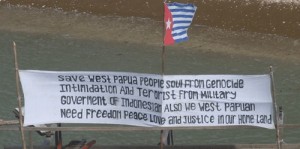
Save West Papua people soul from genocide, intimidation and terrorist from military government of intimidation also we West Papuans need freedom, peace, love and justice in our homeland
In 2005 Herman organized himself, and forty-two other West Papuans, to circumnavigate their homeland in a traditional double-outrigger canoe (especially built for the journey) and cross the dangerous Torres Strait currents to the north coast of Australia. Torres Times photographer Damien Baker captured their landing on an isolated inlet at Mappoon in far-north Queensland, and the remarkable odyssey sparked media reports around the world. When Immigration Minister Amanda Vanstone granted them asylum a couple of months later, Indonesian President Yudhoyono angrily recalled his Ambassador from Canberra. Prime Minister Howard’s efforts to reconstruct his government’s relationship with Indonesia culminated with the Lombok Treaty (2006), which outlawed independence activities in both countries. Herman meantime assisted a bevy of Australian NGOs settle his companions in Melbourne, including setting up the West Papua Christian Fellowship at St Hilary’s Anglican Church.
In 2009 Herman participated in an advanced study of non-violence run by The Fletcher School of Law and Diplomacy at Tuft University in Massachusetts, and in 2010 commenced studying conflict analysis and resolution at George Mason University in Fairfax Virginia. He believes that people’s dignity and their culture, as well as the laws of God and of the secular world are equally essential pillars of the West Papuan independence and self-determination project. Like other West Melanesia advocates, he also believes West Papua’s independence will mark an advance in deomcracy in Indonesia. To date he has organised two conferences at George Mason: The Washington Solution in 2010, and West Papuan Culture and Human Rights in 2012.
Herman’s story was chronicled in documentary by Erin Morris ‘A Journey to Freedom’
Visit Herman’s blog
